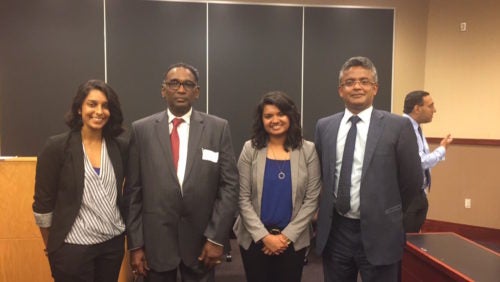Georgetown Law Asia, South Asian Law Students Association (SALSA) Explore Constitutional Right to Privacy in India
October 24, 2017

Sonika Data L’19; Honorable Mr. Justice Jasti Chelameswar, Judge Supreme Court of India; Merin Cherian L’19; and Sajan Poovayya, Senior Advocate, Supreme Court of India at Georgetown Law on October 11.
On October 11, Georgetown Law Asia and the South Asian Law Students Association (SALSA) hosted a vibrant discussion on the development of the constitutional right to privacy in India. The panel featured Indian Supreme Court Justice Jasti Chelameswar, the author of a recent decision affirming a constitutional right to privacy, and Sajan Poovayya, a prominent Supreme Court advocate who had argued the privacy case before the Supreme Court. The event was co-sponsored by Amnesty International, OutLaw and the Muslim Law Students Association.
Justice Chelameswar’s decision in Puttaswamy v. Union of India made headlines around the world when it was issued in late August. At the heart of the case was the Indian government’s far-reaching biometric identity scheme, the so-called Aadhaar Card. Privacy advocates argue that the Aadhaar program fails to sufficiently delineate how an individual’s biometric information can be used, creating the very real risk that the database – which now includes information on more than 1.2 billion Indian citizens – could be used in ways that violate individual rights.
For Poovayya, who argued the case, the decision touches on the most fundamental elements of law and governance in India. “There is no democracy worth having, if we don’t build a strict limited government,” Poovayya said, pointing to the need for meaningful privacy safeguards to be added to the Aadhaar program. Poovayya expressed his hope that the Indian government would act soon, in light of the Puttaswamy decision.
The impact of the unanimous decision, which unambiguously establishes privacy as a fundamental constitutional right, goes well beyond this particular program. Indian legal advocates working on a range of issues – including LGBT rights, criminal justice reform and counter-terrorism, among others – will be using the decision to bolster their own litigation work.
Professor James V. Feinerman, Georgetown Law’s associate dean for transnational programs, highlighted the importance of hearing from top legal voices like Chelameswar and Poovayya.
“This is a major opportunity to hear directly from the judges and lawyers who are shaping the future of Indian law,” Feinerman said at the event, noting that he was gratified to see both American and international students in the audience. ”As twenty-first century lawyers, all of us need to be thinking comparatively, thinking globally, as we tackle new legal challenges.”
Thomas Kellogg, the executive director of Georgetown Law Asia, noted that Puttaswamy drew directly on decades of U.S. Supreme Court jurisprudence on the right to privacy.
“It’s wonderful that constitutional rights jurisprudence remains a key American export,” Kellogg said. “At the same time, shouldn’t American judges and lawyers be encouraged to follow Justice Chelameswar’s comparative approach? All of us have a lot to learn from judges in India and elsewhere, especially on cutting-edge issues like privacy rights.”